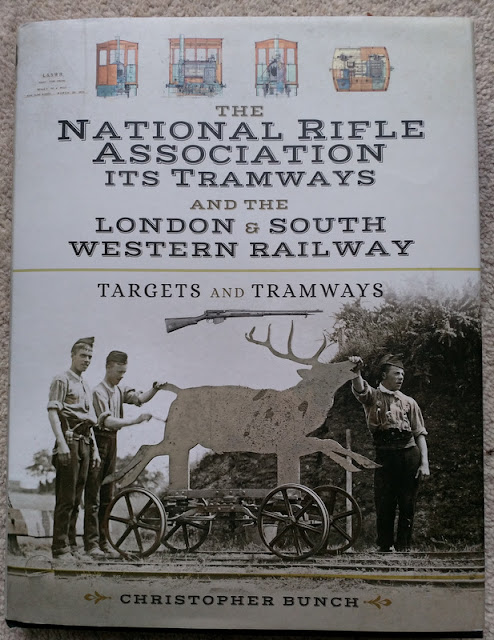Now I'm a fan of obscure and long forgotten railways, especially if there is a narrow gauge connection, but it has to be said that the latest book I've been sent takes obscure to new levels. I never knew this, but Britain has a National Rifle Association established in the mid 19th century, and it had both standard and narrow gauge railways. The National Rifle Association - Its Tramways and the London and South Western Railway by Christopher Bunch tells the story.
The early part of the book covers how the NRA came about, and held annual meetings on Wimbledon Common. There is a lot of coverage of the relationship with the L&SWR and other railway companies that brought members to the event, but more interesting to me was the establishment of a narrow gauge tram to transport people across the common to the furthest butts - which gained a neat little tram locomotive. This railway was dismantled after the meeting and reconstructed the following year.
The NRA then moved to a permanent site at Bisley in Surrey, where a standard gauge branch was built into the site from the local station. Operated by the L&SWR this line handled large numbers of people for the week or two of the annual meeting, sometimes including through trains direct from London, but had a quieter life the rest of the year. It was extended to adjacent military camps during the world wars.
As well as the branch line, the narrow gauge tramway was re-established at Bisley. There were other narrow gauge railways too, from the short manually operated tracks for moving targets, to more extensive lines to service the other targets, which for a while had industrial locos.
Although a very niche subject, this book has a bit of an identity crisis, being both a railway book and - in places - giving a history of the NRA. As a railway enthusiast with no interest in the NRA I could have lived without that aspect of the book. It's also quite a text-heavy book, with lots of extracts from contemporary sources, although there are also plans and maps, and some well reproduced photos (more photos would have been nice, but I suspect they are somewhat rare). It's a good sized hardback of good quality, and despite the depth of content is easy to read. Overall it seems a well researched and produced publication that will find interest amongst those who like obscure railways, and also no doubt those with an interest in the NRA (which is still in existence at the same site).
As a modeller I often look at the potential for modelling obscure minor railways, and the book probably contains enough information for a reasonable model of the standard and/or narrow gauge lines to be built. It would make a rather different layout theme, but I suspect operation would be rather dull! The narrow gauge tramway locomotive would make a very attractive model (original drawings are reproduced in the book). However I now know about an unusual railway location that I'd bet few railway enthusiasts would ever have heard of.




No comments:
Post a Comment